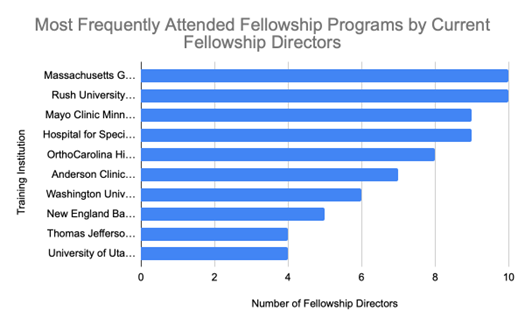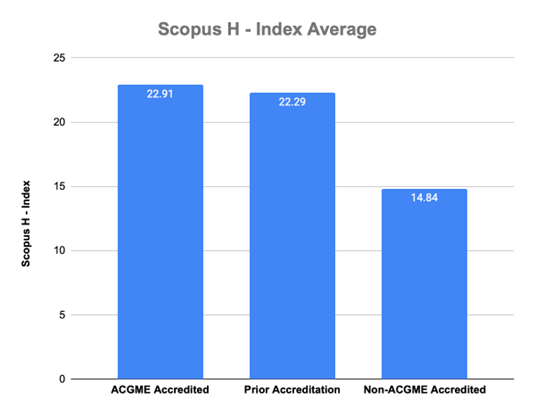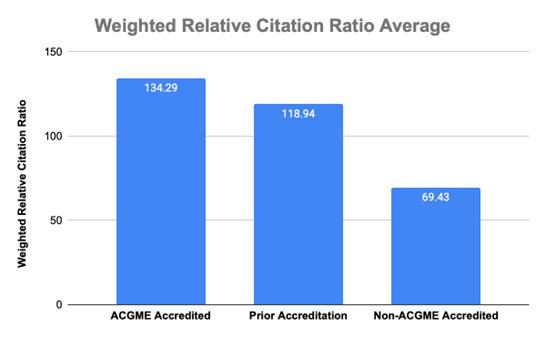Abstract
Introduction: Variation between academic quality of American College of Graduate Medical Education (ACGME) and non-ACGME accredited adult reconstruction fellowship programs has not been previously examined. The purpose of this study is to compare ACGME and non-ACGME-accredited adult reconstruction fellowship programs’ degree of diversity and academic contribution by evaluating program directors’ diversity, academic impact, and contribution to the field of arthroplasty.
Materials and Methods: We utilized the American Academy of Hip and Knee Surgeons Fellowship Directory to ascertain all fellowship directors and the ACGME Public Accreditation Data System to identify accreditation status. Demographic data included ethnicity, gender, and prior training institution. Academic data was obtained through the National Institute of Health iCITE and Scopus databases. We stratified fellowship directors by ACGME accreditation status.
Results: Compared to non-ACGME accredited fellowship directors, ACGME accredited adult reconstruction fellowship directors have significantly greater average h-index score (h-index=22.9 versus14.8, P<0.01), relative citation ratio (RCR=134.3 versus 69.4, P<0.01) and number of publications on both Scopus and iCITE databases (Scopus publications =87.7 versus 49.8, P<0.01), and iCITE publications =73.2 versus 40.2, P<0.01). Compared to non-ACGME-accredited fellowship directors, fellowship directors of programs with ACGME accreditation depict a decreased percentage of Caucasian representation (82.8 versus 68.2%), an increase in Asian American (11.8 versus 22.6%), Hispanic/Latino (3.2 versus 4.5%), and African American (2.2 versus 4.5%) representation.
Discussion: Adult reconstruction programs with ACGME accreditation are led by fellowship directors who are more diverse and have significantly greater academic contribution and impact compared to directors of non-ACGME accredited programs.
Keywords
Adult reconstruction fellowship, Fellowship program director, Academic productivity
Introduction
The demand for total joint arthroplasty (TJA) is projected to rise significantly, with total hip arthroplasty (THA) expected to exceed 1.2 million and total knee arthroplasty (TKA) surpassing one million annually by 2050, while the number of practicing orthopedic surgeons is anticipated to decline by 14% from 19,001 to 18,834 between 2020 and 2050 [1]. Revision arthroplasty volumes are expected to increase dramatically, by 137% for TKA and 601% for THA by 2030 [2]. Studies have shown improved patient outcomes for TJA performed by adult reconstruction fellowship-trained surgeons compared to those without subspecialty training [3]. However, there is limited research evaluating the quality of fellowship education in adult reconstruction, particularly in ACGME-accredited programs.
The American Council for Graduate Medical Education (ACGME) aims to enhance resident and fellow education through accreditation standards. [4] Prior studies suggest that incorporating ACGME guidelines into fellowship programs improves trainee experience and patient care. [5] Despite these efforts, there is a paucity of data assessing the academic quality of ACGME-accredited adult reconstruction fellowships compared to non-ACGME-accredited programs. Academic productivity, measured by metrics such as the Scopus h-index and the National Institutes of Health (NIH) iCITE weighted relative citation ratio (RCR), serves as a proxy for educational quality, reflecting a fellowship director’s contributions to the field [6–8]. Additionally, diversity among fellowship directors is increasingly recognized as critical for fostering mentorship and inclusivity in orthopedic training [9]. This study aims to compare the academic productivity, impact, and demographic diversity of fellowship directors in ACGME-accredited versus non-ACGME-accredited adult reconstruction programs to address this research gap.
Materials and Methods
To identify all ACGME-accredited adult reconstruction programs, the official ACGME Public Accreditation Data System database was utilized (accessed March 2023). Data regarding the current fellowship director and the year of the program initial accreditation was obtained. The American Association of Hip and Knee Surgeons (AAHKS) Fellowship Directory was utilized to identify all orthopedic adult reconstruction programs and current fellowship directors (accessed March 2023). The Scopus database search engine (Elsevier BV, Waltham, Massachusetts) was utilized to obtain h-index scores and the number of publications for each fellowship director (accessed March 2023). The National Institute of Health iCITE database search engine (https://icite.od.nih.gov/) was utilized to find weighted RCR and number of publications for each Fellowship Director (accessed March 2023). For both the Scopus and iCITE searches, validity was maintained through a thorough analysis of each author's publications to ensure attribution to the correct author. Demographic information pertaining to each fellowship director, including ethnicity, sex, fellowship and residency program attended, highest academic degree (DO, MD, and PhD), and highest academic appointment (Professor, Associate Professor, Assistant Professor, Instructor), was obtained through publicly available online resources. Institutional review board approval was not sought as this study does not involve any patient information. Student t-tests and analyses of variance tests were utilized for two and three-group analyses, respectively. Fellowship programs were determined to be academic or private programs based on reported university and college affiliations. If a program did report affiliation with either a college or university, it was determined to be an academic fellowship, while those without such reported affiliations are considered a private fellowship. Statistical significance was set at a value of P<0.05.
Results
Demographic results
In total, 113 orthopedic adult reconstruction fellowship programs were identified. Of those 113 programs, two programs list two co-fellowship directors for a total of 115 fellowship directors included in the final analysis. Of the 115 fellowship directors, 114 (99.1%) were men and one woman. Regarding the highest awarded academic degree, 110 (95.7%) were MD only, four (3.5%) were DO only, and one (0.87%) were MD/PhD (Table 1). Analyses of the ACGME accreditation status of the 113 programs depicted that 22 (19.5%) have currently active ACGME accreditation and 91 (80.5%) are currently non-ACGME accredited. The average length of current accreditation is 17 years, with a range of 1 to 32 years of accreditation.
The ethnicity of all 115 fellowship directors prior to stratification by accreditation depicts 92 (80.0%) Caucasian, 16 (13.9%) Asian American, four (3.5%) Hispanic/Latino, and three (2.6%) African American (Table 1). Ethnicities of the 22 Fellowship Directors of ACGME-accredited programs were 15 (68.2%) Caucasian, five (22.7%) Asian American, one (4.5%) Hispanic/Latino, and one (4.5%) African American. Of the 93 fellowship directors who did not have ACGME accreditation, ethnicities were 77 (82.8%), Caucasian, 11 (11.8%) Asian American, three (3.2%) Hispanic/Latino, and two (2.2%) African American (Table 1).
Current fellowship directors’ prior training institutions for fellowship and residency were analyzed. It was found that the most common institutions for fellowship were Harvard University – Massachusetts General Hospital (n=10), Rush University (n=10), Mayo Clinic – Rochester (n=9), and the Hospital for Special Surgery (n=9) (Figure 1). The most common institutions for residency training of current fellowship directors are listed in Supplemental Figure 1.
There were ten out of twenty-two (45.5%) fellowship directors of ACGME-accredited programs who attended an adult reconstruction fellowship program that is currently ACGME-accredited. There were 18 out of 93 (19.4%) fellowship directors of non-ACGME-accredited programs who attended an adult reconstruction fellowship program that is currently ACGME-accredited (Table 1).
Academic appointments of the ACGME-accredited program fellowship directors were Full Professor 11 (50%), Associate Professor six (27.3%), and Assistant Professor five (22.7%). The academic appointments of the non-ACGME-accredited program fellowship directors were Full Professor 13 (14%), Associate Professor 15 (16.1%), Assistant Professor 29 (31.2%), Instructor one (1.1%), and no academic appointment 35 (37.6%) (Table 1).
|
Demographics |
All Fellowship Directors N (%) |
ACGME Accredited Fellowship Directors N (%) |
Non-ACGME Accredited Fellowship Directors N (%) |
|
Men |
114 (99.1) |
22 (100) |
92 (99.0) |
|
Women |
1 (0.87) |
0 (0) |
1 (1.1) |
|
MD |
110 (95.7) |
22 (100) |
89 (96.0) |
|
DO |
4 (3.48) |
22 (100) |
4 (4.3) |
|
MD/PHD |
1 (0.87) |
0 (0) |
1 (1.1) |
|
Caucasian |
92 (80.0) |
15 (68.2) |
77 (82.8) |
|
Asian American |
16 (13.9) |
5 (22.6) |
11 (11.8) |
|
Hispanic/Latino |
4 (3.5) |
1 (4.5) |
3 (3.2) |
|
African American |
3 (2.6) |
1 (4.5) |
2 (2.2) |
|
Attended ACGME Accredited Fellowship |
28 (24.3) |
10 (45.5) |
18 (19.4) |
|
Did not Attended ACGME Accredited Fellowship |
87 (75.7) |
12 (54.5) |
75 (80.1) |
|
Professor |
24 (20.1) |
11 (50.0) |
13 (14.0) |
|
Associate Professor |
21 (18.3) |
6 (27.3) |
15 (16.1) |
|
Assistant Professor |
34 (30.0) |
5 (22.7) |
29 (31.2) |
|
Instructor |
1 (0.87) |
0 (0) |
1 (1.08) |
|
No Academic Appointment |
35 (30.4) |
0 (0) |
35 (37.6) |
|
Key: ACGME = American College of Graduate Medical Education |
|||
Figure 1. Most frequently attended fellowship programs by current fellowship directors. Included all programs that were attended by five or more current fellowship directors.
Bibliometric results
Analysis of the Scopus database depicts that ACGME-accredited adult reconstruction fellowship directors have an average h-index score of 22.9 and an average of 87.7 publications. For fellowship directors of programs that are non-ACGME-accredited, the average h-index was 14.8, significantly less than ACGME-accredited (P<0.01). The average number of publications was 49.8 for non-ACGME-accredited programs, significantly less than ACGME-accredited (P<0.01) (Table 2, Figure 2, and Supplemental Figure 2).
Analysis of the NIH iCITE database depicts that ACGME-accredited fellowship program directors have a weighted RCR average of 134.3 and an average of 73.2 publications. Fellowship directors of programs that are non-ACGME-accredited had significantly lower average weighted RCR (69.4, P<0.01) and average number of publications 40.2 (P<0.01) compared and ACGME-accredited fellowship directors (Table 2, Figure 3, and Supplemental Figure 3).
Fellowship directors were ranked by h-index. The top 15 fellowship director’s h-indices ranged from 34 to 72 with an average of 47.1. Of the top 15 h-index fellowship directors, 4 (26.7%) programs have current ACGME accreditation, while 11 (73.3%) are non-ACGME-accredited programs (Supplemental Table 1). The top 15 fellowship directors were also ranked by weighted RCR and found to have a range of 417.3 to 217.3 with an average of 303.6. Of the top 15 fellowship directors ranked by RCR, six (40.0%) programs have current ACGME accreditation, and nine (60.0%) are non-ACGME-accredited (Supplemental Table 2).
Fellowship programs were subsequently divided into either an academic program or a private program based on university or college affiliation. There were 72 fellowship directors of academic fellowship programs and 43 fellowship directors of private fellowship programs. Compared with fellowship directors of private programs, the fellowship directors of academic programs had significantly greater average h-index scores (13.8 versus 12.4, P=0.009), and significantly greater average weighted RCR (66.2 versus 58.1, P=0.01). The fellowship directors of academic fellowship programs also had a significantly greater number of publications both on the Scopus database (43.8 versus 41.5, P=0.02) and on the iCITE database (37.9 versus 33.2, P=0.004) (Supplemental Table 3).
|
|
ACGME Accredited Fellowship Directors |
Non-ACGME Accredited Fellowship Directors |
Prior-ACGME Accredited Fellowship Directors |
|
Scopus h-Index (Avg) |
22.9, (SD=15.2) |
14.84 (SD=13.9), (P<0.01) |
22.29, (SD=11.8), (P=0.462) |
|
Scopus Publications (Avg) |
87.7, (SD=70.9) |
49.75, (SD=64.8), (P<0.01) |
89.43, (SD=46.4), (P=0.477) |
|
Weighted RCR (Avg) |
134.3, (SD=114.5) |
69.43, (SD=94.4), P<0.01) |
118.94, (SD=77.0), (P=0.376) |
|
iCITE Publications (Avg) |
73.2, (SD=56.5) |
40.23, (SD=46.8), (P<0.01) |
73.14, (SD=41.9), (P=0.499) |
Figure 2. American College of Graduate Medical Education accreditation status and average h-index
Figure 3. American College of Graduate Medical Education accreditation status and average weighted relative citation ratio.
Discussion
Our findings demonstrate that fellowship directors of ACGME-accredited adult reconstruction programs exhibit significantly higher academic productivity, as evidenced by greater h-index scores (22.9 vs. 14.8, P<0.01), weighted RCR (134.3 vs. 69.4, P<0.01), and publication volumes (Scopus: 87.7 vs. 49.8; iCITE: 73.2 vs. 40.2, P<0.01) compared to non-ACGME-accredited programs. These results suggest that ACGME accreditation may be associated with enhanced academic impact, potentially due to greater access to research resources, institutional support, or higher academic standards [10]. However, factors such as institutional funding, career length, or individual research focus may also contribute to these differences, warranting cautious interpretation.
Compared to prior work by Schiller et al., which reported an average h-index of 16.5 across all adult reconstruction fellowship directors, our study highlights a divergence in academic impact based on accreditation status [10]. The higher productivity among ACGME-accredited directors may enhance trainee exposure to cutting-edge research and mentorship, potentially improving educational outcomes. However, our analysis does not account for surgical training quality or the contributions of other faculty, which are critical components of fellowship education.
Regarding diversity, ACGME-accredited programs show greater ethnic diversity (31.8% non-Caucasian vs. 17.2% in non-ACGME programs), with increased representation of Asian American (22.7% vs. 11.8%), Hispanic/Latino (4.5% vs. 3.2%), and African American (4.5% vs. 2.2%) directors. This aligns with prior research emphasizing diversity’s role in enhancing mentorship and attracting underrepresented groups to orthopedics [9,11–13]. Potential reasons for this trend may include ACGME’s emphasis on inclusive educational environments or urban academic settings attracting diverse faculty. However, the persistent lack of sex diversity (99.1% male directors) remains a challenge, consistent with broader trends in orthopedic leadership [12]. Increased diversity may foster more equitable training environments, but further research is needed to explore its direct impact on trainee outcomes.
Academic appointments also differ significantly, with 50% of ACGME-accredited directors holding full professorships compared to 14% in non-ACGME programs. This suggests that ACGME programs are often led by highly accomplished academics, potentially enhancing educational quality through advanced mentorship and institutional prestige. Pizzo et al. analyzed the RCR and contributions of 488 adult reconstruction fellowship-trained orthopedic surgeons affiliated with orthopedic surgery residency programs. The authors of that prior work found a significant positive correlation between RCR and higher academic distinction of faculty [14]. Our data also indicate that academic programs (72 directors) outperform private programs (43 directors) in h-index (13.8 vs. 12.4, P=0.009), RCR (66.2 vs. 58.1, P=0.01), and publication counts, reinforcing the role of academic infrastructure in supporting research productivity.
Potential limitations
This study relies on h-index, RCR, and publication volume as proxies for academic quality, which may not fully capture educational or surgical training quality [15]. The h-index may favor directors with longer careers, and RCR may be inflated by self-citation [6,8]. Data from self-reported profiles and databases (e.g., ACGME, AAHKS) may contain inaccuracies or outdated information [16]. Additionally, our diversity analysis is limited to fellowship directors, excluding other faculty who influence training environments. The absence of qualitative data, such as director or trainee perspectives, limits our understanding of contextual factors affecting productivity and diversity. Future studies could incorporate interviews or surveys to explore these dynamics and include other orthopedic subspecialties to enhance generalizability.
Conclusion
This study highlights the superior academic productivity and ethnic diversity of ACGME-accredited adult reconstruction fellowship directors compared to their non-ACGME counterparts. These findings suggest that ACGME accreditation may enhance educational quality through greater academic impact and inclusivity, though further research is needed to confirm causality and assess surgical training outcomes.
Declarations of Interest
The authors have not received grant support or research funding and do not have any proprietary interests in the materials described in the article.
References
2. Kurtz S, Ong K, Lau E, Mowat F, Halpern M. Projections of primary and revision hip and knee arthroplasty in the United States from 2005 to 2030. J Bone Joint Surg Am. 2007 Apr;89(4):780–5.
3. Singh V, Simcox T, Aggarwal VK, Schwarzkopf R, Long WJ. Comparative Analysis of Total Knee Arthroplasty Outcomes Between Arthroplasty and Nonarthroplasty Fellowship Trained Surgeons. Arthroplast Today. 2021 Feb 26;8:40–5.
4. American Council of Graduate Medical Education. (2022, September 17). ACGME Common Program Requirements (One-Year Fellowship). ACGME.org. Retrieved March 24, 2023, from https://www.acgme.org/globalassets/pfassets/programrequirements/cproneyearfellowship_2023v3.pdf
5. Zanotti K, Somasegar S, Hooper MW, Hopp E. Improving Value-Based Care Education in a Fellowship by Incorporating ACGME Competencies. J Grad Med Educ. 2019 Dec;11(6):668–73.
6. Quaia E, Vernuccio F. The H Index Myth: A Form of Fanaticism or a Simple Misconception? Tomography. 2022 May 1;8(3):1241–3.
7. Elsevier. (2015, November 26). H-index. h-index | Elsevier Scopus Blog. Retrieved March 24, 2023, from https://blog.scopus.com/topics/h-index
8. Hutchins BI, Yuan X, Anderson JM, Santangelo GM. Relative Citation Ratio (RCR): A New Metric That Uses Citation Rates to Measure Influence at the Article Level. PLoS Biol. 2016 Sep 6;14(9):e1002541.
9. Cannada LK. Women in Orthopaedic Fellowships: What Is Their Match Rate, and What Specialties Do They Choose? Clin Orthop Relat Res. 2016 Sep;474(9):1957–61.
10. Schiller NC, Donnally CJ 3rd, Sama AJ, Schachner BI, Wells ZS, Austin MS. Trends in Leadership at Orthopedic Surgery Adult Reconstruction Fellowships. J Arthroplasty. 2020 Sep;35(9):2671–5.
11. Poon S, Kiridly D, Brown L, Wendolowski S, Gecelter R, Vetere A, et al. Evaluation of Sex, Ethnic, and Racial Diversity Across US ACGME-Accredited Orthopedic Subspecialty Fellowship Programs. Orthopedics. 2018 Sep 1;41(5):282–8.
12. Kamalapathy PN, Raso J, Rahman R, Harihar S, Lozano-Calderon S, Hassanzadeh H. Orthopedic Surgery Fellowship Directors: Trends in Demographics, Education, Employment, and Institutional Familiarity. HSS J. 2023 Feb;19(1):113–9.
13. Winfrey SR, Parameswaran P, Gerull KM, LaPorte D, Cipriano CA. Effective Mentorship of Women and Underrepresented Minorities in Orthopaedic Surgery: A Mixed-Methods Investigation. JB JS Open Access. 2022 Nov 23;7(4):e22.00053.
14. Pizzo DM, Imam N, Sudah SY, Faccone RD, Akinrodoye M, Manzi JE, et al. Evaluation of the National Institutes of Health-Supported Relative Citation Ratio Among Fellowship-Trained American Orthopaedic Joint Reconstruction Surgery Faculty: A New Bibliometric Measure of Scientific Influence. J Arthroplasty. 2023 Jan;38(1):165–70.
15. Silvestre J, Thompson TL, Wilson RH, Nelson CL. Surgical Benchmarks for ACGME-accredited Adult Reconstructive Orthopaedic Fellowship Training. J Am Acad Orthop Surg. 2022 Oct 15;30(20):999-1004.
16. Ahmed SA, Elnemer W, Eltorai AEM, Mariorenzi M, Daniels AH, Cohen EM. In-depth Analysis of Adult Reconstruction Fellowship Websites. Orthopedics. 2020 Sep 1;43(5):e447–53.



